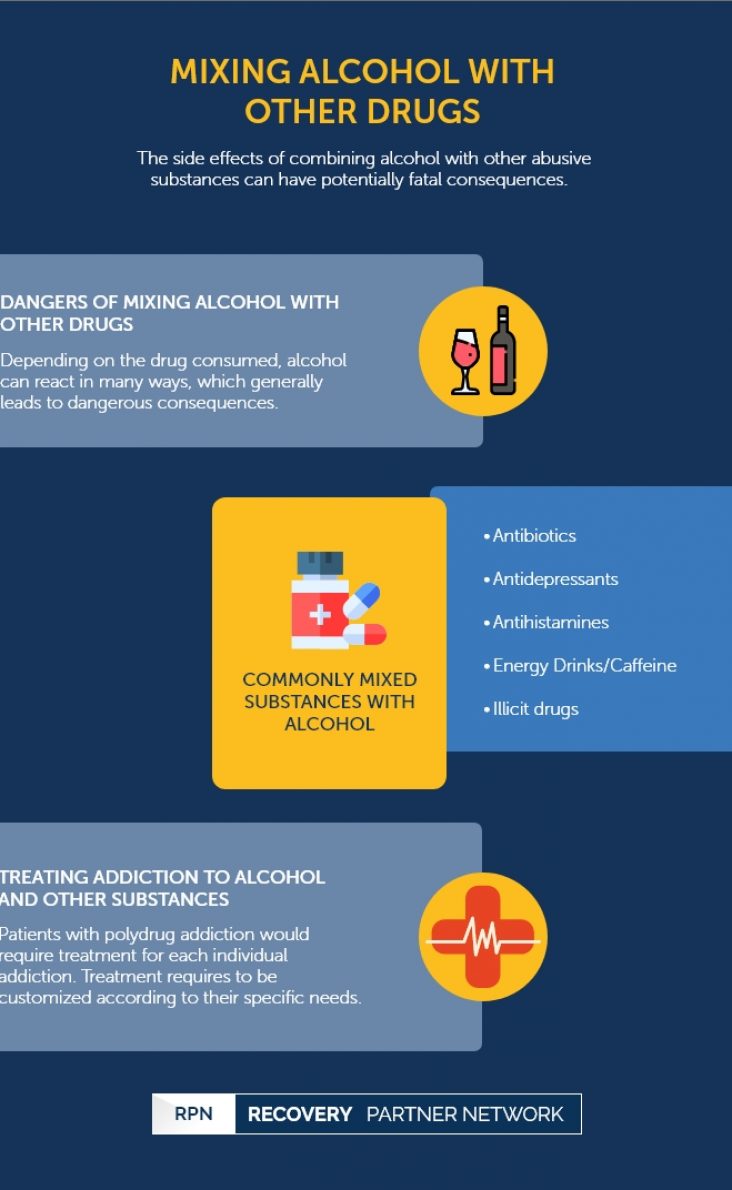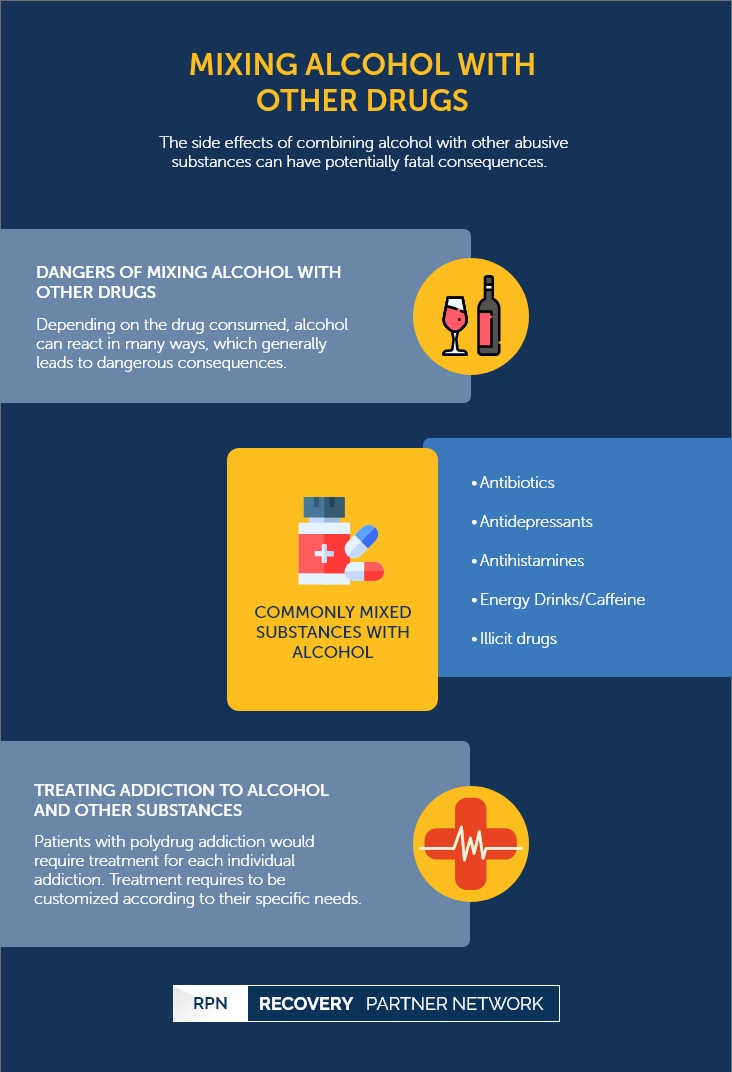The side effects of combining alcohol with other abusive substances can have potentially fatal consequences.
Mixing Alcohol with Other Drugs
Mixing Alcohol With Other Drugs | Table of Contents
Mixing Alcohol with Other Drugs
As alcohol is the most commonly abused substance in the US and around the world, it is generally combined with other legal or illicit drugs to enhance its effects. Alcohol’s highly reactive properties can impact different systems in our body during encounters with other substances.
During the combination of opioids and alcohol, alcohol contains the capacity to amplify the effects of the drug to dangerous levels. In cases that involve a number of prescription medications, alcohol can fully or partially neutralize the effects of the drug, resulting in equally dire consequences.
Depending on the drug consumed, alcohol can react in many different ways. As most interactions between drugs and alcohol result in dangerous consequences, it is vital to consult a physician if an individual is on prescription medications.
FAQ
- What drugs interact with alcohol?
- What medications can you not mix with alcohol?
- Can you drink alcohol while taking anti anxiety medication?
Alcohol can intensify the sedative effects of barbiturates, benzodiazepines, opioids, antipsychotics, sedative antihistamines, and certain antidepressants.
Painkillers, anti-anxiety medications, sleeping pills, antibiotics, ADHD medications, antidepressants or mood stabilizers, diabetes medications, and blood pressure medications are a few types of medications that should never be mixed with alcohol.
Consuming anti-anxiety medications with alcohol can be dangerous.
Commonly Mixed Substances with Alcohol
- Adderall
- Antibiotics
- Antidepressants
- Antihistamines
- Cocaine
- Energy Drinks/Caffeine
- Ecstasy
- Legal and Illicit Opioids
- Marijuana
- Hallucinogens
- Meth
This drug is generally combined with alcohol due to the common misconception that stimulants such as Adderall can deflect the depressant effects of alcohol. However, the combined effects of these two substances further aggravate the negative effects of both substances, which can result in adverse health complications. Although alcohol contains the capacity to decrease the sedative effects of Adderall, the risks of an overdose are significantly increased during this practice.
Some of the negative effects of combining alcohol with Adderall are:
- Increased blood pressure
- Accelerated heart rate
- Arrhythmia
- Risk of stroke, heart attack, or other heart diseases
There are various types of antibiotics available, each of which interacts differently with alcohol. Thus, it is crucial to be aware of its negative side effects when combined with alcohol. One of the biggest risks of mixing alcohol with antibiotics is liver damage, as both are processed in the liver. In addition, certain antibiotics do not work as effectively when taken with alcohol.
Some of the other negative effects of combining alcohol with antibiotics are:
- Nausea
- Dizziness
- Vomiting
- Tiredness
- Increased heart rate
- Shortness of breath
Alcohol and antidepressants amplify the effects of each other, resulting in a heightened intoxication when combined. Alcohol can also neutralize the effects of antidepressants, which can cause a hindrance to an individual’s treatment process.
When consumed together, the body may sometimes metabolize alcohol before an antihistamine. This process can cause a decrease in the effectiveness of the medication. Alcohol can also cause other serious side effects when combined with an antihistamine.
There seems to be a common misconception about the use of alcohol concurrently with cocaine. Although false, most individuals believe that alcohol and cocaine cancel each other out. In fact, alcohol and cocaine produce a third substance in the body named cocaethylene. Cocaethylene induces heightened levels of cardiovascular activity compared to any other drug. This substance can cause extreme stress and pressure on the heart that can cause cardiac arrest or even death.
These substances can cause an individual to consume potentially dangerous amounts of alcohol. These drinks also leave the body dehydrated and thus accelerate the risks of alcohol poisoning and severe hangovers. When combined together with alcohol, individuals tend to increase their levels of intoxication.
Alcohol reduces the euphoric highs and physical impairments generated by Ecstasy when combined. However, this combination can also cause tremendous pressure on the kidneys, dehydration, and even fatal consequences. Since alcohol and Ecstasy lower inhibitions on their own, taking them together can also significantly increase the chances of irresponsible and risky behaviors, overdose, or alcohol poisoning. This practice can also be dangerous due to the unpredictable nature of illicit Ecstacy pills.
Combining alcohol with opioids such as Vicodin, heroin, Percocet, and fentanyl can be extremely harmful as they amplify the depressive effects of each other, causing potentially fatal respiratory failure and sedation. The deadliest side effect of taking alcohol with opioids is depressed breathing. Without sufficient oxygen, the brain begins to shut down various organs of the body, resulting in brain damage or death. Combining these two substances can also impose serious damage to the liver.
Some of the other side effects of combining alcohol with opioids are:
- Cardiovascular instability
- Coma
- Abnormal behavior
- Changes in blood pressure
- Dehydration
- Loss of consciousness
- Nausea and vomiting
- Irregular heart rate and rhythm
- Loss of co-ordination or dizziness
- Marked disinhibition
- Respiratory arrest
Combining alcohol with Marijuana can cause adverse side effects, such as dizziness, vomiting, severe intoxication, paranoia, decreased functioning, and serious harm to the central nervous system. Marijuana suppresses the gag reflex that leaves intoxicated individuals unable to vomit, and thus increase the risk of alcohol poisoning. This practice can also cause severe intoxication among users that could result in negligent and criminal behavior due to the lack of rational thinking.
Combining alcohol with hallucinogens is quite common, especially since alcohol mellows down the adverse side effects of these substances. In contrast, hallucinogens such as mushrooms and LSD, neutralize the side effects of alcohol, such as the feeling of intoxication. However, it is extremely dangerous to combine alcohol with hallucinogens as they may cause severe side effects such as vomiting, nausea, and other gastrological effects. Combining alcohol with hallucinogens can also cause traumatizing hallucinogenic trips, severe depression, and suicidal thoughts and behaviors.
Alcohol and meth are considered to be a lethal combination. Combining them can put extreme strain on the heart, raise blood pressure, worsen hangovers, and damage kidneys. Since violent behavior and sexual promiscuity are quite common with both substances, combining them can significantly increase its likelihood.
FAQ
- What happens when you mix alcohol with antipsychotics?
- What happens when you mix alcohol and Seroquel?
- What happens when you mix ADHD pills and alcohol?
- Is it bad to mix Zoloft with alcohol?
- Can you drink alcohol while on Lisdexamfetamine?
- Can I drink while on methylphenidate?
Combining alcohol with antipsychotics can make the medication less effective.
Drinking alcohol while taking Seroquel can cause drowsiness, agitation, aggression, memory loss, and lack of concentration.
Consuming ADHD medications with alcohol over a prolonged period can cause mental health problems such as depression and negatively affect a person’s ability to concentrate, remember, or solve problems.
Alcohol must be avoided when taking Zoloft as it can cause severe side effects.
There are no studies available to expose the dangers of Lisdexamfetamine and alcohol.
Alcohol can affect the way methylphenidate is meant to function. Hence it is not safe to drink while on methylphenidate.
Treating Addiction to Alcohol and Other Substances
The practice of consuming more than one addictive substance is referred to as polydrug abuse. Patients who find themselves addicted to more than one substance would require treatment for each individual addiction. This practice makes treatment more challenging, as each patient’s treatment requires to be customized according to their specific needs.
The detox process can be especially challenging and dangerous since the withdrawal symptoms of all substances abused appear during this stage. Thus, it is crucial for patients with an addiction to alcohol and other substances to detox under the supervision of a medical professional to reduce the impact of the withdrawal symptoms. After the completion of detoxification, patients must seek further treatment at an inpatient treatment center to help address the psychological dependence on each substance. Patients suffering from an addiction to multiple substances will require intensive long-term treatment and therapy to help them recover from their addiction.
After the successful completion of the treatment program, patients will be advised to partake in support groups, such as Alcoholics Anonymous (AA) and Narcotics Anonymous (NA), to maintain a prolonged recovery.
Recovery Partner Network
We aim to educate and empower. If you feel our library of resources does not cover your specific need, reach out to us, and we would be happy to help.
STATISTICS
© Copyright 2025


